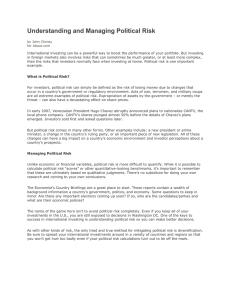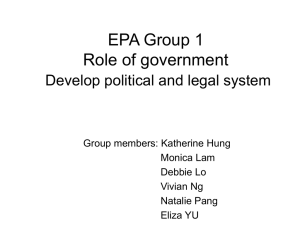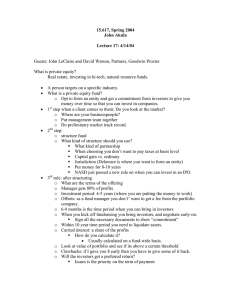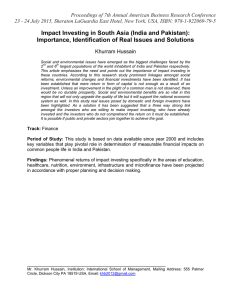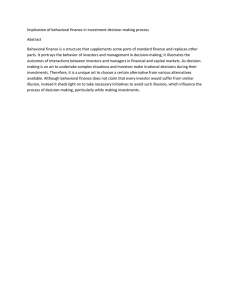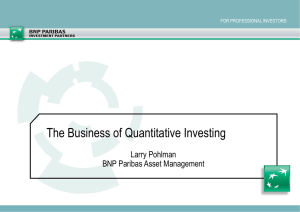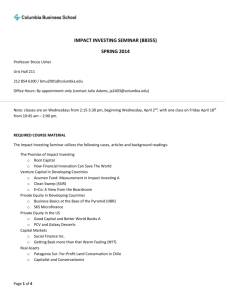IMPACT INVESTING SEMINAR (B8355) SPRING 2015
advertisement
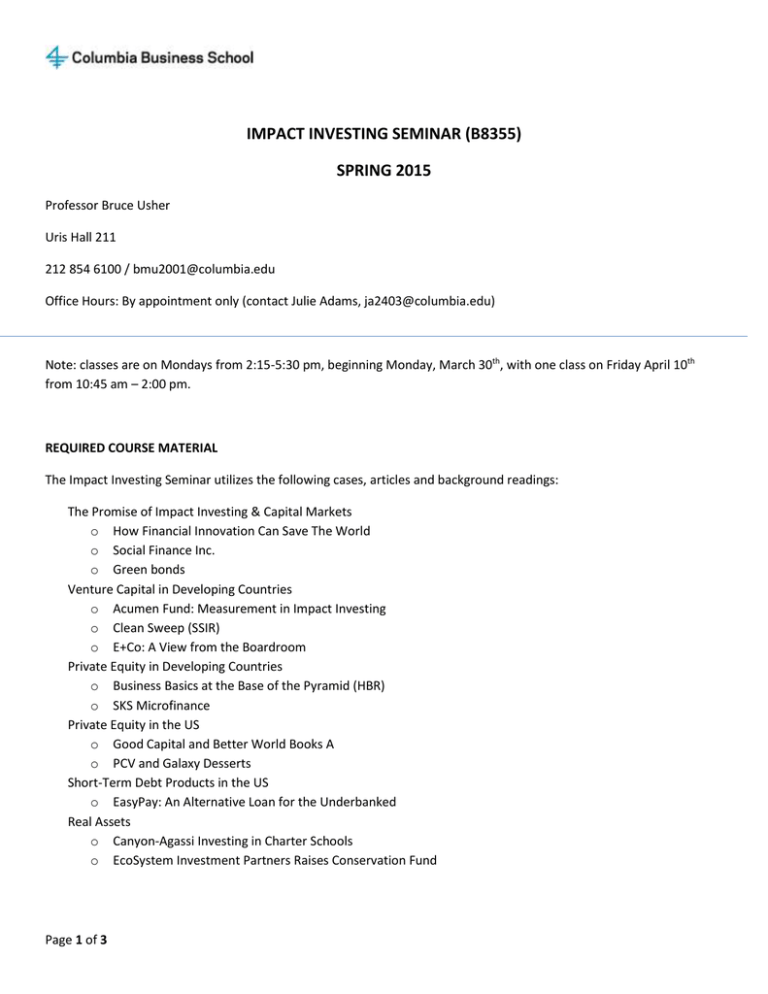
IMPACT INVESTING SEMINAR (B8355) SPRING 2015 Professor Bruce Usher Uris Hall 211 212 854 6100 / bmu2001@columbia.edu Office Hours: By appointment only (contact Julie Adams, ja2403@columbia.edu) Note: classes are on Mondays from 2:15-5:30 pm, beginning Monday, March 30th, with one class on Friday April 10th from 10:45 am – 2:00 pm. REQUIRED COURSE MATERIAL The Impact Investing Seminar utilizes the following cases, articles and background readings: The Promise of Impact Investing & Capital Markets o How Financial Innovation Can Save The World o Social Finance Inc. o Green bonds Venture Capital in Developing Countries o Acumen Fund: Measurement in Impact Investing o Clean Sweep (SSIR) o E+Co: A View from the Boardroom Private Equity in Developing Countries o Business Basics at the Base of the Pyramid (HBR) o SKS Microfinance Private Equity in the US o Good Capital and Better World Books A o PCV and Galaxy Desserts Short-Term Debt Products in the US o EasyPay: An Alternative Loan for the Underbanked Real Assets o Canyon-Agassi Investing in Charter Schools o EcoSystem Investment Partners Raises Conservation Fund Page 1 of 3 REQUIRED PREREQUISITES AND CONNECTION TO THE CORE Students must have completed or be concurrently enrolled in B8306 - Capital markets and investments. The learning in this course will utilize, build on and extend concepts covered in the following core courses: Core Course Corporate Finance Decision Models Global Economic Environment I Managerial Economics Connection with Core 1. Time value of money 2. Efficient markets 3. Risk 1. Use of analysis in decision making 2. Decision making under uncertainty and risk 1. Role of financial markets in the economy 2. Exchange rates 1. Analyzing complex decision making under uncertainty Students will be expected to have mastered these concepts and be able to apply them in the course. Students who have previously taken Finance & Sustainability (B8349) will find overlap with this course; approximately 25% of the material is the same. COURSE DESCRIPTION This course is intended to provide students with an overview of the range of investing approaches used by impact investors. This will be done through a combination of cases and lectures by the professor, and guest presentations by leading impact investors and thought leaders. The substantive areas covered will include: (1) financial instruments used to fund social enterprises (for-profit, nonprofit and hybrids); (2) the differing financial return and social impact return expectations of impact investors; (3) how investors and investment/wealth managers and advisors structure their impact investments; and (4) strategies used by impact investors to search for impact investing opportunities. As well as investor perspectives, the course will explore the role of financial innovation in the financing of social enterprises. This course is designed around the different types of impact investments from the perspective of investors, and is composed of five modules: 1. Introduction to Impact Investing and Capital Markets – overview of the sector and investors, and innovations in capital markets products including social impact bonds and green bonds. 2. Short-term debt products – cash and short-term debt products designed for impact investors in the U.S. 3. Venture Capital and Private Equity in Developing Countries – funds and high net worth investors making early and growth stage equity investments in social enterprises in developing countries. 4. Venture Capital and Private Equity in the U.S. – funds and high net worth investors making early and growth stage equity investments in social enterprises in the US. 5. Real Assets – impact investors in real estate and land conservation. Page 2 of 3 COURSE OBJECTIVES This course is designed for both MBA students planning a career in traditional investment management who want to understand the potential impact of their work and for students planning a career in social enterprise want to understand impact investing from the perspective of the investor. This course does not examine the role of the social entrepreneur, or the process for raising capital from impact investors for a social venture, but focuses solely on the various sources of impact investing capital and the types of investments being made by impact investors. ASSIGNMENTS Students are required to individually prepare 2 case write-ups during the course, each of which is a maximum of one page. The final exam is a take-home case analysis. METHOD OF EVALUATION This course will utilize readings, cases and guest speakers. Each of the classes will begin with a lecture and case discussion led by the professor, followed by a guest speaker. The guest speakers are primarily investors or asset managers from the impact investing sector, providing an opportunity for students to meet industry specialists. This course requires active class participation, and students’ grades will be heavily dependent on the quality of class discussion. Grades will be based on class participation, two one-page responses to study questions prepared ahead of the class, and one short end-of-term paper. The paper will be 5 pages (or less) plus exhibits, and will require the student to explain which of the different types of impact investments presented during the course is optimal for reaching the double bottom line goals of an impact investor. Class participation Case write-ups (Type B – group/individual) Final take-home exam (Type C - individual) 40% 20% 40% CLASSROOM NORMS AND EXPECTATIONS Students are required to prepare for each class by reading and analyzing the assigned cases, utilizing the study guidance questions which are provided in the Canvas system. Students are expected to add thoughtful analysis to each class discussion. Page 3 of 3
